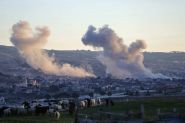
The Lebanese Association of the Knights of Malta, known as Order of Malta Lebanon, celebrated the feast of its patron, St. John the Baptist, at the invitation of its President Marwan Sehnaoui alongside the association’s members, and in the presence of Her Excellency Maria Emerica Cortese, the Ambassador of the Sovereign Order of Malta to Lebanon. A solemn Mass was held at Saint Elias Church – Kantari, celebrated by the Apostolic Nuncio to Lebanon, His Excellency Monsignor Paolo Borgia, and concelebrated by Bishop Paul Marwan Tabet, representing Patriarch Mar Bechara Boutros al-Rai and Bishop César Essayan, the Apostolic Vicar of the Latin Church in Lebanon, along with representatives of the patriarchs of various Christian denominations.
The Mass was attended by Lebanon’s First Lady Neemat Aoun, representing President of the Republic General Joseph Aoun; MP Michel Moussa, representing Speaker of Parliament Nabih Berri; and Minister Joe Issa al-Khoury, representing Prime Minister Nawaf Salam. Also present were several current and former ministers, representatives of the Lebanese Army Commander-in-Chief and heads of security agencies, as well as representatives of various religious communities, members of parliament (past and present), ambassadors and members of the diplomatic corps.
Extending congratulations on the occasion were Sheikh Mahmoud al-Khatib, representing the Grand Mufti of the Republic, Sheikh Abdel Latif Derian and Sheikh Sami Abdel Khalek, representing the Sheikh Aql of the Druze Unitarian Community, Sheikh Dr. Sami Abou al-Mona.
The Mass was also attended by the embassy’s advisor François Abi Saab, members of the association and a number of friends and supporters of the Order. The Mass was accompanied by the choir of Notre Dame University (NDU), led by Father Khalil Rahmeh.
In his homily, His Excellency Monsignor Borgia conveyed the blessing of Pope Leo XIV, as an expression of his solidarity with the Order of Malta. He called to respond to the appeal made by the Holy Father sincehe assumed the papacy, to pray and work for peace in the world. He emphasized, “It is a call that requires responsibility and reason, and it must not be drowned out by the noise of weapons and rhetoric inciting conflict.” Borgia underlined the moral responsibility of every member of the international community, every civil or religious institution, and every man and woman of goodwill, to put an end to the tragedy of war before it becomes an irreparable abyss. He continued, “War does not solve problems; it magnifies them and leaves deep wounds in the history of nations that take generations to heal. Tonight, we want to raise our prayer for peace, from here, from this troubled region in the Middle East, and especially from this Holy Land that witnessed the birth of the Prince of Peace.”



Comments